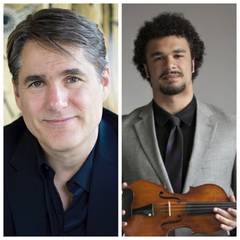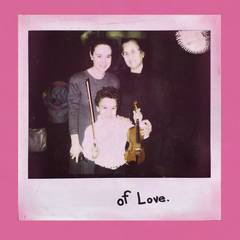|
Back
Curtis Stewart’s Endless Dazzlement New York
Merkin Hall at Kaufman Music Center
06/01/2023 -
“of Love/of Time”
Curtis Stewart: Gone – Thalassaki Mou – Embrace (World Premiere) – City’s Son (based on Duke Ellington and Billy Strayhorn’s Take the A Train) – KNIGHT Music (based on Joseph Bologne’s Violin Concerto No. 9 in G Major)
Oscar Peterson: Hymn to Freedom
David N. Baker: Deliver my Soul
Samuel Coleridge-Taylor: Selections from 24 Negro Melodies: “Deep River” (arr. Hamilton Berry), “They Will Not Lend Me A Child” (arr. Andrew Roistein) & “The Angels Changed My Name” (arr. Curtis Stewart)
Curtis Stewart (Violin), Aaron Diehl (Piano), Harlem Quartet: Ilmar Gavilán, Melissa White (Violins), Jaime Amador (Viola), Felix Umansky (Cello); Members of the Next Festival of Emerging Artists Orchestra and Juilliard School, PubliQuartet, Peter Askim (Conductor)
John Schaefer (Host)

P. Askim/C. Stewart
“I don’t require lust, sex, or classic beauty; I require trust, respect, and honesty. All else builds from there.”
Oscar Peterson
“Reality doesn’t impress me. I only believe in intoxication, in ecstasy, and when ordinary life shackles me, I escape, one way or another. No more walls.”
Anaïs Nin, From “A Journal of Love”: The Unexpurgated Diary of Anaïs Nin
After this “Ecstatic Music” concert, the first of a June‑long “Sonic Music” series, one realized the two quotes above are not contradictory. Both Messrs Peterson and Nin used their arts to extract our inner ecstasies. Anaïs Nin breathed her ideas with words exuding both the spiritual and the sexual. Oscar Peterson gave notes releasing an idea‑transcending intoxication.
And Oscar Peterson was one of several composers last night bringing a kind of ecstasy–or more appropriately exaltation–to their music.
The night belonged, though–extravagantly, totally, note for note–to composer, conductor, teacher and extraordinary violinist.
I was probably the only listener in Merkin Hall ignorant of Mr. Stewart, because the huzzahs, hurrahs and shout indicated a huge fan club. And wow! Did he deserve it!! For over two hours, one could forget the Shahams and Bells and Mutters of the world. Mr. Stewart played virtually every temporal scintilla of the evening with the most glorious tones, both dulcet and demanding. His gymnastics up and down the fiddle were not only seamless but seemingly effortless. Even more, no matter what the eclectic sections, every single note coming from Mr. Stewart could have been part of a Paganini cadenza, give or take a century or two.
One wasn’t quite ready to call it simply a fiddle tour de force. He was too good for that. But towards the end of the evening, one was longing for another instrument. The accumulated members of the String Orchestra were fine. But the arrangements were made by–guess who?–Curtis Stewart. Thus his solo violin gleamed and glistened...like, unendingly. And for this non‑acolyte neophyte, far too long.
Still, the music he chose, wrote and performed was curious and inventive. So, one was intrigued with Curtis Stewart’s multilayered homage to his violinist/composer mother. That was the beginning. The other works were equally fascinating. We heard electronic cries and whispers (and Mr. Stewart’s violin itself). On the screen appeared a wide variety of images: Duke Ellington and kaleidoscopes, the violinist as a child with his mother, abstractions where the title “to love” turned into visions from Picasso to Saul Steinberg.
And added to this was that string orchestra (named String Orchestra) with players taken from the widest fields, who played, snapped their instruments, clapped (oh, we the audience had to clap as well). And if I didn’t catch all the imagery, the hip‑hop and the “community conversation” of his Violin Concerto, blame it on my antediluvian age, not the inspiration itself.
Mr. Stewart made us take deep breaths–but these were nothing compared with the deep breadths of the works played. Or rather, were transformed. Who could have guessed that Take The A Train was a hip‑hop classic? (Mr. Stewart did the words, with all the right gestures.) Or that the solemn Negro melodies from the esteemed Black‑English Samuel Coleridge-Taylor could be extended and twisted like a Möbius strip, so that “Deep River” became a torrential ocean, with little relationship to the original.

C. Stewart with parents
Not being part of the Curtis Stewart devotee club, I probably missed much of his message. But half of this program was as interesting as it was provocative, and the expanding homage to his mother was a fitting solo (with graphics, poems, electronics). To live brought forth all of Mr. Stewart’s genius. A wild fantasy land where one was supposed to recognize other works with which he grew up. I recognized a Greek tune, parts of a Brahms sonata, and–fitting toward the end–a few measures of Dido’s Lament.
After that, a soothing wondrous break Oscar Peterson’s Hymn to Freedom and David Baker’s Blues (Deliver my soul), with Aaron Diehl’s piano, each note a diamond amid Mr. Stewart’s agglomerated jewelry shop.
The three following works, were like Jackson Pollock spatterings overpowering Ellington and the spirituals. Yet they were followed with the most sensitive re‑workings of a Violin Concerto by the great West Indian‑French Joseph Bologne.
Bologne could be easily compared to the quarter‑African Alexander Pushkin. Both 18th Century, both great artists, both debonair, suave, endlessly inspired, both reputed swordsmen. (Pushkin tragically so.) Curtis Stewart arranged part of the Concerto with taste, with 18th Century balance, and with just enough quirkiness to assure that his product belonged to this century. It resembled, in a way, Lukas Foss’ Baroque Variations. Yet, like his playing, it was less a remembrance of things past as the incarnation of a another age.
Needless to say, Mr. Stewart’s mastery turned an original accomplishment into his own transcendent inspiration.
Harry Rolnick
|